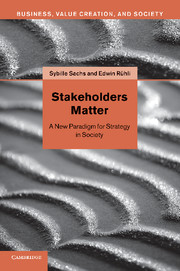Book contents
- Frontmatter
- Contents
- Figures
- Tables
- Foreword
- Acknowledgments
- 1 Challenges for a new paradigm in strategic management
- Part I Development of the basic assumptions of a new stakeholder paradigm
- 2 The economic paradigm and its basic assumptions
- 3 Contribution of stakeholder theory to our understanding of the stakeholder paradigm
- 4 The stakeholder paradigm
- Part II Our understanding of the stakeholder paradigm and its operationalization
- Epilogue
- Appendix Methodological considerations
- Glossary
- Notes
- Bibliography
- Index
4 - The stakeholder paradigm
from Part I - Development of the basic assumptions of a new stakeholder paradigm
Published online by Cambridge University Press: 07 October 2011
- Frontmatter
- Contents
- Figures
- Tables
- Foreword
- Acknowledgments
- 1 Challenges for a new paradigm in strategic management
- Part I Development of the basic assumptions of a new stakeholder paradigm
- 2 The economic paradigm and its basic assumptions
- 3 Contribution of stakeholder theory to our understanding of the stakeholder paradigm
- 4 The stakeholder paradigm
- Part II Our understanding of the stakeholder paradigm and its operationalization
- Epilogue
- Appendix Methodological considerations
- Glossary
- Notes
- Bibliography
- Index
Summary
In this chapter we will first discuss two prominent new theoretical approaches, the “Stakeholder Theory of the Firm” and “Stakeholder Capitalism,” both based on revised assumptions compared to traditional economic and strategy theory. These approaches apply a stakeholder perspective. Both claim that stakeholders matter, but from different points of view. We will analyze these approaches and their basic assumptions according to the same criteria as the economic approaches in Chapter 2. Based on the insights of these approaches and the conclusions we draw in Chapters 2 and 3, we then will clarify the basic assumption of our understanding of the stakeholder paradigm.
The stakeholder theory of the firm
Representatives of the stakeholder theory of the firm increasingly doubt that shareholder primacy is the most effective way to understand strategic management. In contrast to shareholder primacy, they assume that different owners of resources, sometimes based on implicit or incomplete contracts, also contribute to value creation. Consequently, Mahoney claimed at the AoM 2008, “The modern property rights perspective of implicit and incomplete contracting provides a solid economic foundation for the revitalization of a stakeholder theory of the firm within the evolving science of strategic management.”
- Type
- Chapter
- Information
- Stakeholders MatterA New Paradigm for Strategy in Society, pp. 48 - 70Publisher: Cambridge University PressPrint publication year: 2011



